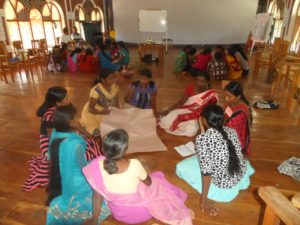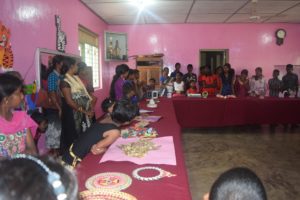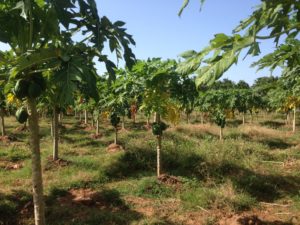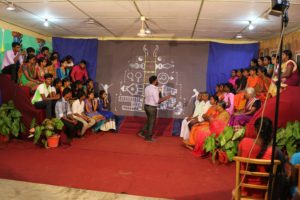Community Development Project (CDP)
 Create a positive environment for children by facilitating the community that is aware, enforce and protect children’s rights.
Create a positive environment for children by facilitating the community that is aware, enforce and protect children’s rights.
The program targets the vulnerable groups such as children, people with special needs, state officers, youths and women in two project villages to ensure rights through enhance capacity of various segments of the community.
Advocacy and Networking initiatives – working with people with special needs and other stakeholders to ensure that the needs of people with special needs are listened to and met.
Development through Education (DTE)
Barriers to education are removed and students complete their education and achieve their full potential, becoming upstanding citizens, contributing positively to their communities and society. Families have the means to lift themselves out of poverty and have increased wellbeing through the promotion of a positive value system.
Child Education and Support: Activities focused on supporting the students to achieve their academic ambitions, through personal and social awareness, parent involvement in education and with teachers, the provision of financial support for basic education needs.
Parental Engagement: Activities focused on supporting parents engage with and understand the importance of their children’s education. The parents meetings and workshops create a platform to build relationships with others, build parenting skills, awareness of issues and encouraging participation in community activities. 
Income Generation: Activities focused on supporting the families to sustain themselves without external support, and thus enable the students to continue their studies without financial pressure. Including Income generation training and exposure visits on alternative means of generating income.
One-off Assistance Fund: The one-off assistance is providing to beneficiaries in emergency situation. This may include Student equipment/stationery in cases of extreme financial hardship; Medical expenses contributions; assistance with a student’s transport to and from school, e.g. provide a bicycle.
Foster a culture a peace in Sri Lanka
Capacitate the targeted staffs with the necessary insight and skills to do conflict transformation, enabling staffs’ emotional & mental preparedness to facilitate conflict transformation and improve civil society participation in transitional justice & reconciliation process.
The project is focusing to enhance the stakeholders to involve in active participation on reconciliation process. SEED focuses increasingly on ensuring that Transitional Justice activities in the programmes. Pursuing this aim, SEED continue its capacity building initiatives for staff members, state staff (Vavuniya Divisional Staff) as well as the people in Vavuniya and Mullaitivu districts.
Integrated Resettlement Programme
The people, who, after multiple displacements by the civil war or natural disaster, have returned to their home towns, benefit from basic infrastructure, reduced their vulnerability by having diversified and seasonal independent household incomes and developed functioning community structures.
Infrastructure development: – Providing support to the people to live in solid accommodation, to meet their basic water & sanitation needs, to access the common infrastructure Eg:- school, internal roads.
Economic development:-Providing capacity building trainings to involve in sustainable income generation activities, provision tools kits, micro finance access and perennial trees.
Social development: – Providing capacity building trainings for further strengthening by the establishment, reactivation of community-based organizations and engagement of individuals to communal activity.
Model Organic Farm
 Ventures related to organic agriculture production, promoting environmentally safe ways of working.
Ventures related to organic agriculture production, promoting environmentally safe ways of working.
• Animal husbandry & Backyard chicken rearing
• Organic Product – fruit and vegetables
Emergency Response
Planning and emergency response to human made and natural disasters.
• Emergency relief – food, shelter, basic infrastructure for families and communities as a result of war and natural disasters such as the Tsunami .
• Co-ordination and planning with other NGOs, INGOs and Government Departments to plan for and implement effective programmes .
• Transition activities from emergency response to disaster risk reduction approach.-activities to help communities assess and address vulnerabilities, risks and coping strategies.
Engaging Youth in Community Development
 Promoting social responsibility among youth in Sri Lanka.
Promoting social responsibility among youth in Sri Lanka.
• Help young people to realize their potential.
• Fully participate in decision making in society.
• Contribute positively to society and undertake humanitarian and development work in a conflict sensitive way.